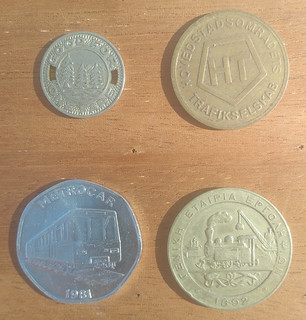
PREV ARTICLE
NEXT ARTICLE
FULL ISSUE
PREV FULL ISSUE
GERMS AND MONEYDavid Pickup submitted these notes about germs and money. Thanks! -Editor
I was always told not to hold things in your teeth such as pencils as there is a danger of accidentally knocking your teeth out. I have never actually met anyone who has had this happen. I cannot say I ever hold coins in my mouth. There would be an unpleasant taste for one thing and if someone pats me on the back to show what as fine chap I am in danger of swallowing my tram fare. (Trams will feature quite a lot in this piece). On 3rd January 1893 The Standard published a letter from a L.M. D'Orsey who was worried he would get cholera from dirty coins. He said pennies in particular were often "absolutely filthy". He suggested local authorities set up disinfecting units and people could exchange dirty for cleaned coins. An early form of money laundering. On 11th July 1913 the Manchester Courier and Lancashire General Advertiser carried a story from a French paper that nickel coins were most sterile. A square centimetre of a nickel coin has a hundred and forty thousand microbes but a copper coin was much dirtier. Money the article pointed out is truly the root of all evil. Every man would have "death in his pocket" as he could not be expected to write a cheque every time he goes on a tram. The Dundee Courier on 28th November 1932 quoted a doctor as saying a man's pockets were full of dirty things including coins and banknotes. Pockets are hardly ever turned out or cleaned. The doctor suggested abolition of pockets! He was Dr Percy Edgelow from London. The idea did not catch on! The only positive health note was on 3rd May 1920 when the Nottingham Evening Post, under the heading "Filthy Lucre" the paper reported on an experiment by the Department of Public Health in New Zealand. They used coins given in change on tramcars and found some bacteria but only the ones that would normally be found on human skin. They then tried out various bacteria but after four hours found there was no bacterial growth. The scientists suggested the metal killed the germs. Keep well! These articles show that the debate over the safety of handling money is age-old and will likely never be resolved to anyone's satisfaction because everyone has a different perception and tolerance of risk. As an engineer I pay attention to the scientists and the probabilities they assign to the risk. I don't like the idea of getting sick or dying any more than anyone else, but I know I do have a higher threshold for risk because many people have ZERO tolerance - they don't want ANY risk, no matter how small. The more studies they see the more scared they become. Emotion takes over and any nonzero risk seems intolerable. And in times like these, who can blame them? The comedian George Carlin had a great routine on "Germs" (look for it on streaming audio apps). It starts with the "germ" of an idea and pushes it to ridiculous extremes, which is the essence of great comedy. In making fun of germaphobe culture he pushes the limits of risk tolerance through the roof and beyond. Before coronavirus it was funny as hell. Now, not so much. -Editor Wayne Homren, Editor The Numismatic Bibliomania Society is a non-profit organization promoting numismatic literature. See our web site at coinbooks.org. To submit items for publication in The E-Sylum, write to the Editor at this address: whomren@gmail.com To subscribe go to: https://my.binhost.com/lists/listinfo/esylum All Rights Reserved. NBS Home Page Contact the NBS webmaster 
|
